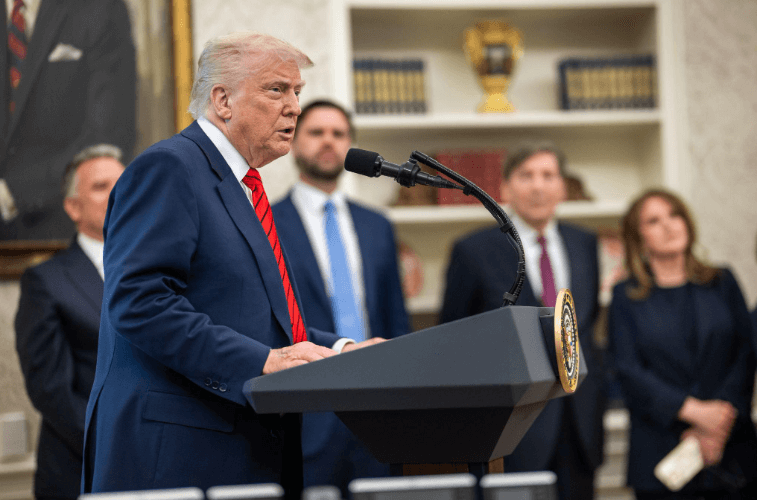President Donald Trump announced Tuesday that he will end U.S. sanctions on Syria “for the first time in more than a decade,” presenting a major U.S. policy shift that follows the overthrow of the Assad regime in December.
The removal of sanctions, which Trump announced in Riyadh during the Saudi–U.S. Investment Forum, reversed the heavy restriction on Syria’s economy that cut the country off from the global financial system. The new government in Damascus, led by interim President Ahmed al-Sharaa, is provided an opportunity to re-establish relations with the U.S. and the world and rebuild their economy.
“In Syria, which has seen so much misery and death, there is a new government that will hopefully succeed in stabilizing the country and keeping peace,” said Trump. “That’s why my administration has already taken the first steps toward restoring normal relations between the United States and Syria.”
Sanctions were initially imposed by the U.S. and other countries due to human rights abuses, including the use of chemical weapons, during Bashar al-Assad’s rule from 1971-2024. Prior to the announcement, Syria was among the most sanctioned countries in the world along with Russia, North Korea and Cuba, according to the Center for Strategic and International Studies, a bipartisan, nonprofit policy research organization.
However, the new Syrian government has aimed to rebrand itself as more moderate by distancing itself from designated terrorist groups, according to Al Jazeera. Now, after more than a decade of war, Trump is seeking to give Syria what he calls “a chance at greatness,” helping al-Sharaa with a key priority he sees as critical to stability and recovery.
“The sanctions were brutal and crippling and served as an important – really an important function,” Trump said. “But now it’s [Syria’s] time to shine.”
Proponents of the move, which include Saudi Crown Prince Mohammed bin Salman and Turkish President Tayyip Erdogan, said ending sanctions would allow humanitarian groups to further engage with the country, bring in foreign investment and enable Syria to rebuild under a new leader.
“I’m incredibly grateful to President Trump for taking the courageous decision to lift sanctions on Syria. I know this is not an easy decision, but we believe very strongly that it’s a necessary decision in supporting the stability of Syria and regional stability,” said Saudi Arabia’s Foreign Minister Prince Faisal bin Farhan. “If we are able to build a Syria that is able to focus on its own future and its development that will have an impact throughout the region, but also because of the long suffering of the Syrian people who deserve, after many, many years of difficulty, of struggle, to have a better future.”
The decision also received praise from members of Congress on both sides of the aisle, including Sen. Jeanne Shaheen (D-N.H.), the top Democrat on the Senate Foreign Relations Committee, who “welcomed” the decision in a statement on X.
“These sanctions succeeded in their original goal of aiding the downfall of the brutal Assad regime,” Shaheen said. “I welcome their removal now to give the new Syria a chance to develop into a free and prosperous state independent of the malign influence of Russia, Iran and China.”
But critics were wary of removing sanctions even after the fall of the Assad regime, citing al-Sharaa’s past ties with al Qaeda, which he severed in 2016, according to Reuters. In the region, Israeli Prime Minister Benjamin Netanyahu and other members of his cabinet have expressed concerns about al-Sharaa’s past and rise to power – sentiment that some in the U.S. share.
“At home, U.S. congressional stakeholders and even some elements within Trump’s administration may also be alarmed by the president’s decision,” Mona Yacoubian, a senior adviser and director of the Middle East Program at CSIS, said in an article published Tuesday. “Many view sanctions relief as important leverage that should be calibrated to Sharaa’s behavior and governance. In this view, the wholesale lifting of sanctions without demonstrable progress toward inclusive governance that eschews hardline Islamist participation deprives the United States of an important lever of influence.”
Trump has continued to show his intentions to start a new era by meeting with al-Sharaa on Wednesday – becoming the first U.S. president in 25 years to meet with a Syrian president. Secretary of State Marco Rubio is also poised to meet with his Syrian counterpart this week, according to Reuters. This comes during Trump’s Middle East trip, which includes stops in Saudi Arabia, Qatar and the United Arab Emirates.

